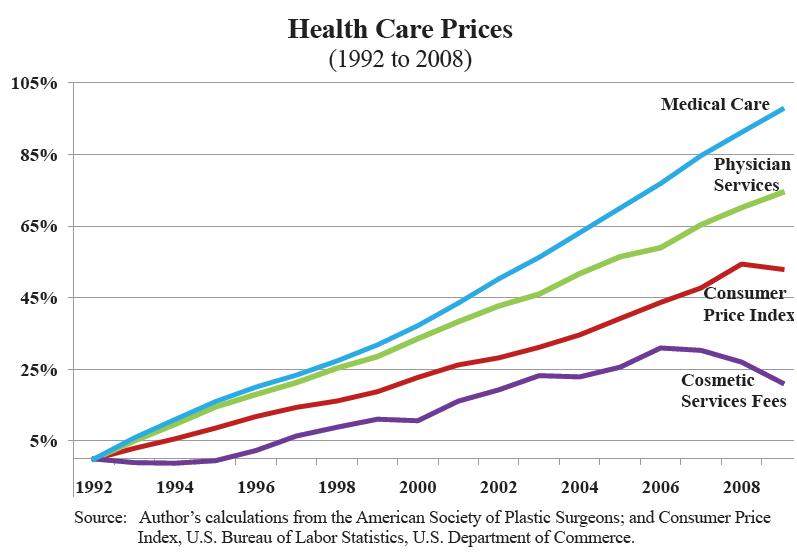I’m reading an article for an upcoming post when I came across this:
We have a shortage of every kind of doctor, except for plastic surgeons and dermatologists.
It strikes me that plastic surgery and dermatology are both examples of medical “care” not subject to insurance and the accompanying government regulation.
And the prices of plastic surgery?
Cosmetic surgery is one of the few types of medical care for which consumers pay almost exclusively out of pocket. Even so, the demand for cosmetic surgery has exploded in recent years. According to the American Society of Plastic Surgeons, 1.7 million cosmetic surgical procedures were performed in 2008. That is more than 40 times the number performed two decades ago (for example, 413,208 in 1992).
Despite this huge increase, cosmetic surgeons’ fees have remained relatively stable. Since 1992, medical care prices have increased an average of 98 percent. The price of physician services rose by 74 percent. [See the figure.] The increase in the price of all goods, as measured by the consumer price index (CPI), was 53 percent. Yet, an index of cosmetic surgery prices only rose only about 21 percent. Thus, while the price of medical care generally rose almost twice as fast as the CPI, the price of cosmetic surgery went up less than half as much. Put another way, while the real price of health care paid for by third parties rose, the real price of self-pay medicine fell.
When exposed to the free market, commodities and services will respond with cheaper prices and higher quality.



Wow talk about taking one idiosyncratic example with numerous explanations (the most important of which is that originally cosmetic surgery was very expensive and only for the very rich), and then over-generalizing with a broad sweeping claim! The market works great sometimes, and bad other times. When people give examples of market problems they’re wrong to claim “see, the market doesn’t function well and it needs to be controlled.” When we see times when the market works well, it’s not enough to say “markets always bring higher quality and lower prices.” It depends. In general, markets will do that, but only if well regulated. On their own, completely free markets tend towards oligarchy.
the most important of which is that originally cosmetic surgery was very expensive and only for the very rich
It’s also one of the few medical procedures exposed to the market. Lasik is too, let’s check that as well:
And:
From the same report I quoted in the post:
I think you are blinded by some belief that only government will save us from ourselves.
It depends. In general, markets will do that, but only if well regulated.
I’m struck by your clinging to the idea of “well regulated.” And I wonder if we each understand what the other means by regulation. For example, can you give me an example of a regulation that you think is good and I would agree with you? And then one that you think is good but I might not agree with you?
No, Pino, I compare. Looking at health care fifty years in the past is irrelevant, with the rise of pharmaceuticals and high tech, that isn’t a valid comparison. Instead, let’s compare with the 31 other advanced industrialized states, all of which have some form of universal health care because most think not to guarantee such is uncivilized and inhumane. All pay less as portion of GDP than we do. Almost all have as good if not better outcomes than we do. None have medical cost bankruptcies that rip apart families — over half our bankruptcies come from high medical costs. There is no real world evidence that suggests just opening it to the “market” would do magic. Indeed, most experts see our problems as a result of too much ‘free market’ that allows the wealthy to get cadillac health care while the lower middle class and poor often suffer or avoid health care (or go into bankruptcy).
Look at the rest of the world. There are REAL examples of how people do it as good if not better, for a lot less money. Everyone is covered, no one goes bankrupt because of medical costs. They look at us and shake their heads — our reputation abroad is one of a country with a substandard and even immoral health care system. I have to agree.
Instead, let’s compare with the 31 other advanced industrialized states, all of which have some form of universal health care because most think not to guarantee such is uncivilized and inhumane.
But of course it’s NOT inhumane.
All pay less as portion of GDP than we do.
But those systems are going broke with the added costs. However, they have the added feature that they deny care, have significant wait times and often can’t provide basic services like general family doctors.
Almost all have as good if not better outcomes than we do.
We’ll never agree on this one. The US has better results in the categories commonly cited: Life Expectancy and Child Mortality.
There is no real world evidence that suggests just opening it to the “market” would do magic.
I just showed you two.
our reputation abroad is one of a country with a substandard and even immoral health care system.
I understand that there are people who feel justified when they take money from their neighbor to the east by gunpoint only to give it to their neighbor to the west for who they feel pity.
I don’t share that view.
Well, we can disagree about what’s inhumane. Those systems are not going broke, they are often stronger than ours, especially in areas of health care. Our debt is higher than most other advanced industrialized states (in terms of debt to GDP – it’s higher in absolute debt too, but that would be an unfair measure as we have a larger economy, so it has to be debt to GDP ratio). The US does not have better results in life expectancy and child mortality – indeed infant mortality rates are rather high in the US. The idea that legal taxation to help provide universal health care and equal opportunity is “taking money from their neighbor at gunpoint” is ridiculous. It goes back to that false belief (but very convenient for the wealthy) that their wealth is all do to their actions, and not a result of the benefits of a stable government, legal system and infrastructure. To call it “taking money at gunpoint” is the same as workers saying owners are treating them as “wage slaves” and taking their work and benefiting from it as a form of theft. Sure, you can look at it both ways, but each way ignores practical reality.
Ultimately the voters decide on how to draw these lines, and which view (are the wealthy living high off the labor and efforts of the poor, or are the poor wanting to just take money from the wealthy) wins out. It’ll be somewhere between the two extremes. I tend to see the wealthy more as benefiting from the work of the poor and using the value they create for their own personal gain. You tend to see the opposite. There is no proof, so we just have to decide and vote on what we believe.
Well, we can disagree about what’s inhumane.
Fair enough. But remember, we’re talking about governments, not people. If you try to make the case that we should take care of our neighbor, you’ll have to make the case why it isn’t the individual through private charity and why it SHOULD be confiscated wealth at the point of the government’s sword.
t goes back to that false belief (but very convenient for the wealthy) that their wealth is all do to their actions, and not a result of the benefits of a stable government, legal system and infrastructure.
Insofar as the government provides proper “infrastructure”, the wealthy have already paid for that. Further, there is no concept of “pay it back.”
Ultimately the voters decide on how to draw these lines, and which view (are the wealthy living high off the labor and efforts of the poor, or are the poor wanting to just take money from the wealthy) wins out.
Lately yes. However, even the voters electing their representatives should be held in check by the constitution.
The US does not have better results in life expectancy and child mortality – indeed infant mortality rates are rather high in the US.
When numbers are normalized, the US does have better numbers.